Today’s blog post is by Rod Martinez, who is returning
to the Steel Pen Creative Writers’ Conference for his second year and will be
presenting two sessions on October 27, including one on dialogue. (Learn more
at www.steelpenconference.org.)
By
Rod Martinez
Dialogue is as important to fiction writers as scenes,
characters and plot are. Unless your book is about two cars that go “Vroom” in
the night, you are stuck in the dilemma we all face.
My name is Rod Martinez. I am an author of Middle
Grade and Young Adult mystery-adventure drama. I am invited to book talks every
year by local schools, and one of the most common questions I get from young
writers is, “How do you make your dialogue so believable?”
Truthfully, as writers we know that real life dialogue
and dialogue in novels are night and day. In real life, we interrupt sentences,
throw “Uh” and “Well” into the mix, and even ignore questions when we feel like
it. You can’t get away with that when you’re writing dialogue or all you’ll do
is annoy your reader. We all know there is no room for that.
When I’m speaking with the youngsters, I tell them:
•
write from experiences you’ve encountered or heard
of
•
write in the character’s head
•
write always knowing what the next action or line
will be
Dialogue doesn’t have to be
the mysterious creature we make it into. Done right it could be the highlight
of your story—well, aside from scenes, narrative, plot, characters…—but you get
the picture.
In the process of writing my
young adult novel Chasing Butterflies,
my editor made it her job to point out the dialogue issues between some characters.
I believe that if you are going to create a character who has his or her own
style of talk, then that talk needs to be showcased in the book. With four
protagonists—a misfit team of people aged 18-21—I had to make this mix work. There
was a hood from the streets, a Hispanic single mom cop, an up and coming
magician from the Jersey shore, and a Kentuckian geek who was a master at
conspiracy theories. How do you get these four to speak with each other and
make it believable to move the story along? You get in their heads, you look
into their past. You create a history rich in drama and adversity where making
them come together seems almost like destiny. In the end, you reader benefits
from awesome dialogue that only you can deliver, and you feel all bubbly inside
from the finished work.
You can do this. Remember
it’s all about the story and all about getting a reader hungry enough to want
to devour your story. Dialogue is a key factor, so make those words believable
and make them magical. You’ve got this.
__________
Rod Martinez was born and raised in Tampa, Florida and
was attracted to words at an early age. His first book, “The Boy Who Liked to
Read,” was created in grade school, and his teacher used it to encourage
creativity in her students. Eventually he discovered comic books, but his high
school English teacher told him to try short story writing. Rod is the
recipient of the 2017 Jerry Spinelli Scholarship from the Highlights
Foundation. His middle grade adventure The
Juniors was picked up by a publisher and the rest—as they say—is history.


No comments:
Post a Comment